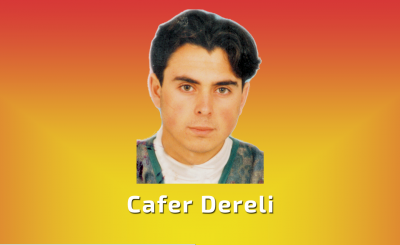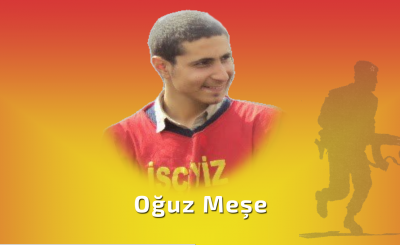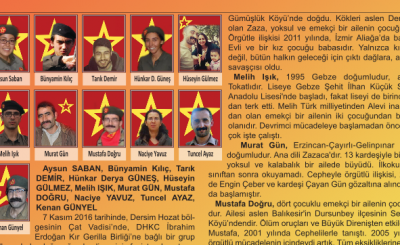Date of Martyrdom: November 9, 2009
Place of martyrdom: Istanbul University Çapa Medical Faculty Hospital
Date of birth: 1968
Place of birth: Çankaya district, Ankara, central Turkey
Place of the grave: Gazi neighborhood cemetery, Istanbul
He had been suffering from serious health problems for years, because of the conditions in the prisons, in which he lived during the long years of his imprisonment. Finally, Eyüp Baş, who was hospitalized on September 23, 2009, with a complaint of abdominal pain, was first diagnosed with jaundice. He was kept under treatment at Istanbul University Çapa Medical Faculty Hospital for 50 days. Despite various medical interventions, he could not be saved. Eyüp Baş, who was revolutionary for 16 years, martyred on November 9, 2009, at 21.40.
Our comrade Eyüp Baş was born in Çankaya district, of Ankara, the capital city of Turkey in 1968. His family moved there, from Kelkit district of Gümüşhane province, northeast Turkey. He grew up in Ankara. He left school in the 2nd grade while he was in Dikmen High School. He was a child, of a poor family. He saw and learned what labor and exploitation were through living and working. He worked as a plumber and heating systems technician. He worked in factories, various facilities, and construction sites, and operated a coffee house.
On May 4, 1992, a house in Dikmen district, in Ankara, in which at that time four revolutionaries were located, was surrounded by the police. Our comrades clashed and martyred in this siege. There was a coffee house opposite that house. The owner of this coffee house was Eyüp Baş. Both the massacre and the resistance happened in front of his eyes.
That day is the day in which Eyüp Baş started to become a revolutionary. Sometime after the massacre, he met with the supporters of the Party-Front, who went to investigate what has happened in the house in which 4 revolutionaries martyred, and this acquaintance turned into a relationship with the organization after a short time. The armed actions in the period of Advance of our movement(the first half of the 1990s) had already increased Eyüp Baş’s sympathy for the Devrimci Sol (Revolutionary Left) movement, so he was ready to become a member of Devrimci Sol (Revolutionary Left) in away.
He carried out organizational activities in the slums of Ankara. He gradually assumed responsibilities in the work among people’s masses in the districts of Dikmen, Mamak, Altındağ, and Keçiören in Ankara. In 1994, he participated in many protests against the “April 5 Robbery Package of Laws”(a series of laws and regulations implementing the neo-liberal reforms in Turkey in the first half of the 1990s). While continuing this struggle, he was arrested on June 28, 1994.
Since he became a revolutionary, he has not refused to perform any of the tasks to which he was assigned. He did not say “I cannot do it, I am not ready.” In 1996, he was one of the resisters in the Death Fast against the attack of the oligarchy to bring cell-type prisons to life. He became a veteran as a result of the resistance.
The 1996 Death Fast was a turning point in his life as revolutionary. He later described this turning point as: “Being revolutionary was the peak of my life, which would continue during my entire life. I had no longing for the capitalist system after the victory. “
Since then he has lived as a “revolutionary for life”. He gave his last breath as a revolutionary.
In 2000, the oligarchy once again attacked the revolutionary prisoners. During the December 19, 2000 massacre, he was in Çankırı Prison under attack with gas bombs, bullets, and torture. After the massacre, he was sent to the F Type isolation Prison Sincan, located near Ankara. He was held in solitary confinement cells with torture until November 2004.
During the 2000 Death Fast resistance, Eyüp Baş, like the other 1996 Death fast veterans, was not allowed to go on a Death fast. Although he struggled to accept this, he continued to take on different roles. Deaths continued, Eyüp’s revolutionism was growing: “I always acted with the concern of what I can do more. Because we gave many martyrs. I was also not on a death fast. Each of our martyrs forced me even more and increased my working tempo. “
When he was released in 2004, he was ready for new missions with his growing revolutionaryism. He assumed responsibilities in the relations with the leftist movement and the struggle of the poor people of Küçükarmutlu neighborhood in Istanbul.
He was a worker of the unity of the left. Our comrade Eyüp was released from the Sincan F-Type Prison in 2004 and after a while, he was assigned to work to ensure the unity of revolutionary, democratic, progressive, and patriotic forces. It was undoubtedly a difficult area. It was a field where grouping and competitiveness were running wild. He completed this task successfully. He was a principled, persistent, and determined comrade in defending the Party’s views. He was combative, resilient, uncompromising against deviations and distortions, and by possessing all these qualities, the maximum sacrifice, flexibility, and effort was shown to ensure the unity of the whole left. From the organization of the May Day actions to bringing the left to law and tradition against “violence within the leftist movement”(a phenomenon common in Turkey, in which different leftist organizations can even carry out armed attacks against each other, to “solve” their problems and conflicts”), to the latest organization of joint actions for revolutionary prisoner Güler Zere, he had contributed with his work. He took part in the formation of various actions and associations in the Middle East, Europe, and the world, and implemented our internationalist policy aimed at the unity of peoples against imperialism. His modest contributions within the mandate given by the organization, to the unified struggle of the leftist movement in Turkey and peoples of the world will not be forgotten.
He was in the middle of the fight. He was an ordinary soldier in the struggle. He was the one who gave his efforts and work without thinking for status and career. While he had a task to fulfill, nothing could demoralize him, prevent him from completing what he was doing. He said: “The only answer I can give to the question of what does the party means to me; It is “Everything”. It is everything I find myself in it that embodies everything about good, beautiful, human, and human values. “
He gave everything to what was “everything” for him. Finally, he gave his life for our revolution.
Our revolution, like all our martyrs, will keep his memory alive.




